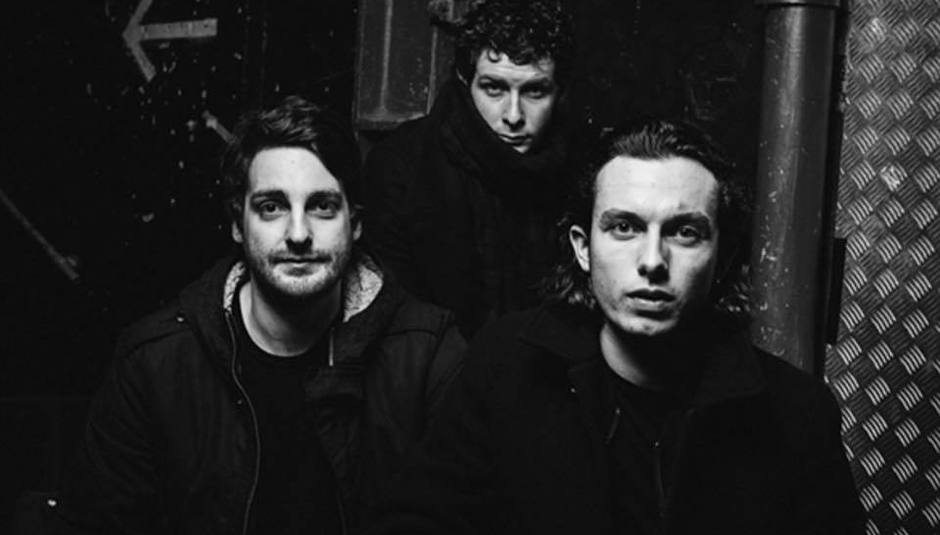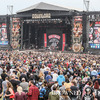London based trio Desert Mountain Tribe released one of 2016's finest debuts in Either That Way Or The Moon. While their roots lay in the psychedelic rock underground, the three-piece create anthemic soundscapes with grandiose intentions way beyond any genre or scene.
Having formed back in 2012, the band have established themselves as one of the hardest working bands on the circuit having released a batch of critically acclaimed singles and EPs prior to putting out their aforementioned first album. Not to mention extensively touring both the UK and Europe in the process.
DiS caught up with the band - Jonty Balls (guitar & vocals), Philipp Jahn (bass), and his brother Felix (drums) - during a recent visit to the Faroe Islands where they've been recording songs for their forthcoming second long player.
DiS: You’re currently recording your second album at Bloch Studios on the Faroe Islands. What’s your first impression of the islands?
Phillip Jahn: Very beautiful. The only thing that’s missing is a dragon flying through those mountains!
Why did you choose to record the album here?
PJ: We wanted to try something new. The idea of being in a remote place with very few distractions also appealed. We’re only doing half of it here; we’re recording the other half in Oxford. So in total, it will probably be five songs here and four in Oxford.
What’s been different about the recording sessions here to the ones you’ve previously done back in the UK?
PJ: It’s light all the time! It never really gets dark here.
Jonty Balls: It’s the biggest mind fuck ever. Your body doesn’t know what to do.
PJ: In a way, it’s easier to be more creative but at the same time I think we need a little darkness to record as well.
You’ve combined recording the album with an appearance at G! Festival in the Faroes. You’re the only UK band on the bill. Would you recommend the festival to other UK acts?
Felix Jahn: It’s great to record here because there aren’t as many distractions as somewhere like London so it’s easier to focus on what we’re doing.
JB: I’d definitely recommend playing the festival and recording here if you get the opportunity. If you’re going to hike and explore the island it’s the best place to come.
PJ: It’s very interesting to witness a country with a very small population. Fascinating to just talk to people and understand how the Faroese have retained their own identity. There is no crime here.
JB: It’s true. People leave their front doors open all day and all night without any bother. There’s been two murders on the islands in about 15-20 years.
Were the five songs you've recorded ready before you came here?
JB: We had ideas but they've changed quite a lot since we've been here. We knew how the actual songs would be structured but there's certain elements we've moved around such as the bass or guitar parts.
FJ: I think that's the big difference between our first album and this one. When we recorded that album all the songs were there. We knew exactly what we wanted the record to sound like. Every song was perfect in that we knew exactly how we wanted each part to sound; where the bridges were, where the bass came in every time, the drum parts, Jonty's guitar and vocals, everything. Whereas this time we went into the studio with a bunch of ideas and thought let's see where this album takes us.
JB: So we'll have finished this whole album in the space of a month. We're so happy with it so far.
FJ: This is far more exciting. We laid down the bass yesterday and then someone said let's try out the guitar a different way and suddenly a song changes direction, which never really happened on the first album. Then we knew what we were going to play whereas this one has been way more liberating.
PJ: It's opened doors.
JB: We were a bit worried at first. There is that tension when it comes to writing a second album so it was good to be able to relax in the studio. Give ourselves space to the point we completely forgot we were writing an album. We started off with a couple of songs then every single rehearsal afterwards came up with at least one new song. And more importantly, we were happy with what we'd come up with. We'd spend maybe four or five hours on each song then come back the next day and record it. That was the biggest challenge, coming back the next day and playing it again. Yet every time we went back it sounded great.
PJ: It wasn't as if we had to come up with a number of songs in any given timescale either. There was no rush. If we hadn't liked the songs we'd have scrapped them straight away. But it wasn't like that.
FJ: When we listened back to the songs in the studio we were blown away with the results. For me especially as I'm normally only used to hearing them from behind the drums. You get a completely new perspective that wasn't there before.
JB: It's the same for us guys out front hearing Felix's drums. We've never heard them sound like that before. It's given us a whole new dimension when it comes to writing and recording.
When did the writing process start? When did the first ideas materialise?
PJ: June. We wrote the album in eight or nine sessions. That was it. And we had a holiday in between as well.
Are there any songs or ideas left over from the sessions that might be revisited in the future?
PJ: Maybe. There are a few bits and pieces.
JB: The old intro for starters. At the time it didn't feel great but it is something we'll definitely be revisiting.
PJ: One of the songs on the new record is one of the first we ever wrote as a band. We wanted to put it on the first album but it didn't fit, so it will definitely be on this one. I guess it kind of clashed with 'Interstellar' on the first record because both songs are very similar. One thing I can say is this album will be much shorter than the first one. This one is way more relaxed.
You've always been labelled a psych band even though elements of your music don't necessarily fit in with that genre. Is it something you feel constraining and are you striving to remove that tag with the second album?
PJ: I get why people call us psych rock as elements of our music does fall into that category, but I often think that term is used to describe any kind of experimental guitar music.
FJ: Calling something psych is so lazy these days. It seems like anything with two or more effects pedals qualifies as psych.
When are you hoping to release the album?
PJ: We originally wanted to bring it out in November but it's probably going to come out early next year now, probably March.
JB: It was the same with the first record. We aimed for a particular date and it ended up coming out five months later.
PJ: We're hoping to have all the mixing done by late August, early September. A lot of the delays are down to getting the vinyl editions pressed. Because it's important to us that they are ready for release day.
Will there be a tour to coincide with the release?
JB: Yeah, but it will be when the album comes out. We've got a lot of shows booked between now and then where we will be playing new songs every so often.
PJ: It keeps the live set fresh even though will still enjoy playing the old songs too.
FJ: It's time to move on and bring some new songs into the set.
We've talked about the difference in approach between making the first and second albums. If you had the benefit of hindsight, is there anything you'd change about that first record?
PJ: Musically no. But in terms of marketing the record then definitely.
JB: I don't think you can ever be 100% happy with any recording but that album stands as a document of that time. It's where we were as a band back then so I don't really think thee's anything I would have changed about it at that time. It's in the past; there's no point looking back. I would have liked more people to have heard the record at the time so hopefully when this comes out it will get the attention it deserves. Maybe that will make people revisit the first album.
Why do you think the first album didn't get as much recognition as it probably deserved, particularly from the UK music press?
PJ: I don't know. We don't get it. That's why when you asked the previous question about what I'd do differently I'd say revisit the way that album was marketed because a lot of people never got to hear about the record when it was first released.
Has the current political climate in the UK and Europe influenced the way you write or make music?
JB: It plays on your emotions, of course it does.
FJ: In particular here with Brexit. In the States with Donald Trump. It's beginning to affect all of our lives and you can't turn your back on it any more. Therefore it definitely affects our songwriting because we base most of it on emotions and what's happening around us. It's reflected in our music 100%. We're at the stage where everyone has to make a stand. It's not OK what's happening right now. For years and years you were able to just ignore it because you thought it would never happen. But not any more. I don't want us to be seen as a political band because that's not the reason we started this band, but at he same time I think we're in a privileged position to be able to voice our discontent at what's going on in the world right now. That's not to say we should preach at people or tell them to do things differently because we're not educated enough to do that. Too many people voice their opinions without reading up on the facts first. Especially on social media. We're all influenced by different opinions but that doesn't make us all experts. At the end of the day there are people that know a lot more about the world economy than I do. Obviously what is happening right now isn't the way it should be, but then I'm also not in a position to say what it should be like either. Nevertheless, that doesn't mean you shouldn't raise your voice either when something is not right. It's becoming more and more important to do so right now.
Social media seems to be having a massive impact right now and in some cases more detrimental than positive.
JB: Social media is possibly the worst thing in the world right now. I see friends on Facebook that haven't got a clue about or any interest in politics and they're putting up four paragraphs which they've copied and pasted from someone else and its embarrassing to watch them try and debate it in the comments after.
PJ: Social media is the worst thing to happen to our society.
What advice would you give to new bands that are just starting out?
JB: If your heart's not in it and it's not the only thing you really want to do, don't. Otherwise you'll still end up in the same band at 30 playing the odd pub gig here and there.
PJ: If you're not into it 100% don't bother.
JB: Sitting there writing songs and playing guitar with your mates is the best thing in the world so if you're fortunate enough to be in that position at least give it the best shot you can. You've really got to want to do it because you'll have no money for the first few years. There is no financial benefit for a very long time.
PJ: But it should never be about the money. If it's only about the money then don't do it.
Are there any new bands you'd recommend Drowned In Sound and its readers should check out?
FJ: Morgan Delt's Phase Zero is such a great album. It's really Californian. If you've been there you'd probably get it.
JB: Imperial Daze are fantastic.
FJ: I also really like My Expansive Awareness. We're playing with them in Spain.
PJ:*There's a great band we saw at Karmafest in Leeds called Float. Also Pretty Lightning from Saarbrücken in Germany are amazing.
For more information on Desert Mountain Tribe, please visit their official website.






















